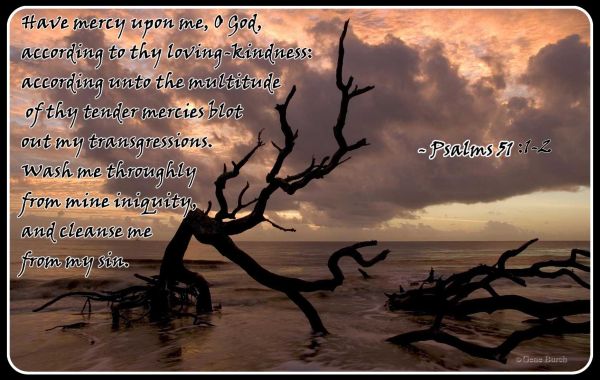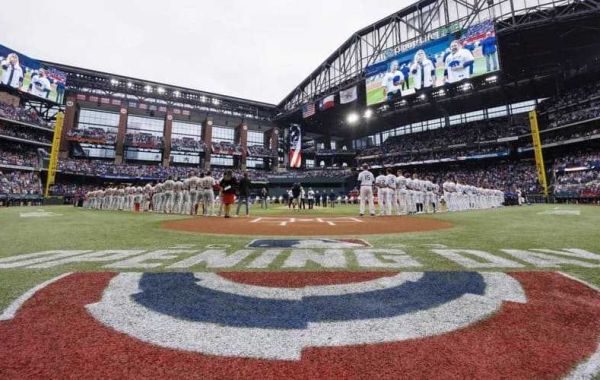Have mercy upon me, O God, according to thy lovingkindness: according unto the multitude of thy tender mercies blot out my transgressions. Wash me throughly from mine iniquity, and cleanse me from my sin. For I acknowledge my transgressions: and my sin is ever before me. Against thee, thee only, have I sinned, and done this evil in thy sight: that thou mightest be justified when thou speakest, and be clear when thou judgest. Behold, I was shapen in iniquity; and in sin did my mother conceive me. Behold, thou desirest truth in the inward parts: and in the hidden part thou shalt make me to know wisdom.
David’s Plea
David pleads with God for mercy because of God’s lovingkindness and because of the multitude of tender mercies a blotting out of his transgressions. He asks God to wash him throughly from iniquity and to cleanse him from his sin.
The Hebrew word for mercy is חָנַן ḥânan; and in its basic form it means to bend or stoop in kindness to an inferior. David is asking God to bend down, to condescend, to show mercy.
David knows that God’s mercy is not deserved, especially after his heinous sin, it can only be appealed to because of God’s lovingkindness. The word means exactly what it says, God is loving and God is kind. It is one of his attributes, one of his characteristics. It is one of the revelations of God. In the New Testament the equivalent of this word would be grace.
Paul said it this way in Ephesians 2:7 That in the ages to come he might shew the exceeding riches of his grace in his kindness toward us through Christ Jesus.
The second part of David’s plea to God is in vs. 2.
He asks God to thoroughly wash away his iniquity and to cleanse him from his sin.
In these first two verses David uses three word for sin as though one little three letter word could never be enough to confess what he has done.
The word transgression is פֶּשַׁע p̱eša‘; it means a revolt, a rebellion, a trespass. Iniquity is ‘avown aw-vone; and it means perversity, moral evil, a fault. And the little three letter word sin is חַטָּאָה ḥaṭâ’â; and it means an offence against God.
This is what David has done, he has rebelled against God, he has left morality for immorality and his has offended the God he love and who loved him.
And because of his sin, his iniquity his transgression he pleads, “Oh God wash me and cleanse me from the stains of my sin. David also uses three words for forgiveness: “blot out” is mahah and it pictures the crossing out of a debt in the account book; The word “wash” is kavas; and it conveys the idea of washing out a dirty stain in a garment. The word “cleanse” is taher and it depicts sin as a moral leprosy. And like leprosy the purification required the direct pronouncement of God.
The third part of David’s plea is his acknowledgment of his sin in vs. 4-6. Here is his the depths of his confession.
He confesses, “I acknowledge my transgressions: and my sin is ever before me.
He knows that as great as his offense was against Bathsheba and Uriah, it is God that above all others he must confess, “4 Against thee, thee only, have I sinned,
and done this evil in thy sight: that thou mightest be justified when thou speakest, and be clear when thou judgest.”
He knows that he was, “5 shapen in iniquity; and in sin did my mother conceive me.”
And he acknowledges how far his sin removed him from God’s purpose in his life, “6 Behold, thou desirest truth in the inward parts: and in the hidden part thou shalt make me to know wisdom.” But that purpose was blocked, it was lost because of David’s sin.
Confession of Our Sin
In these opening verses there is more truth than I can apply to us today. From this first emotional, spiritual, heart-broken plea of David’s we can hear and see our need for forgiveness from God and the necessity of voicing that plea.
John said in his first epistle, 1 John 1:9 9 If we confess our sins, he is faithful and just to forgive us our sins, and to cleanse us from all unrighteousness. He wrote that to believers. Believers just likd David, just like himself, just like us.
The life of a believer, the life of a Christian cannot be lived as it should be without confession and repentance of sin, our sin, my sin. I must seek God’s forgiveness because of his grace, acknowledge my sin in all its depths and I must seek God’s cleansing of that sin from my life. “Wash me throughly from my iniquity.”
And like David we must realize how far our sin has removed us, hindered us, obstructed us from God’s purpose in our lives. We can’t be what God created and designed us to be, if there is unconfessed and unrepentant sin in our lives. We can’t be that father, mother, child, pastor, pastor’s wife, church member, soul winner or even the child of God that He wants me to be, if I don’t confess my sins and ask God to cleanse me, every day, every time, every instance.
David was the greatest King God in his grace put upon the throne of Israel and his sin was the darkest against the grace of God. Do we think somehow that we will not sin against that same God of grace? Sin is a part of our life even as children of God, confession and cleansing must also be part of our life.
Buscar
entradas populares
Categorías








